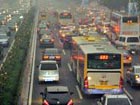| Videos | ? Latest |
|
? Feature | ? Sports | ? Your Videos |
Beijingers suffer car-related problems

Beijing saw one of its worst traffic jams on Monday after the National Day Holiday. It had been predicted by the Beijing Traffic Control Center, and the effects seem to be waning. But the forecast for future traffic and air quality is bleak, with surging numbers of cars taking to the roads every day.
This is an experience most Beijingers have to bear almost everyday.
But on Monday, it started at 6:30, earlier than the usual 7am threshold. By 8am, the number of blocked roads increased to more than a hundred.
On main roads, cars were crawling at snail's pace.
Taxi Driver, Beijing, said, "There are too many cars on the road today. Usually, it takes forty minutes to travel 10 kilometers, but now, two hours have passed."
A big problem caused by traffic jams is pollution. The particulate pollution, mainly from the cars' exhaust, is blamed for 95 percent of the pollution in Beijing.
The number of black particulates in these bottles is roughly equivalent to an ordinary-sized car's emissions in an hour.
Du Shaozhong, Deputy Head Beijing Environment Protection Bureau, said, "The pollutants discharged by cars contain more than a-hundred cancer-causing substances. Besides, cars pollute the lower level of the air, doing more harm to residents."
Meanwhile, compared to residents in other major cities in China, Beijingers spend the longest time going to work. That's 40 minutes when the road is clear of traffic and more than one hour when traffic jams occur. The solution is not clear.
Rong Jian, Head of Research Center, said, "We can build more roads in Beijing. But the speed of road building will never catch up with the pace of the growing number of cars."
By September this year, the number of cars in Beijing was 4.5-million, and the number will soar to 7-million by 2015.
If the growing pace continues, the traffic flow will be 15 kilometers on average by that time, roughly the speed of jogging.
 0
0 






